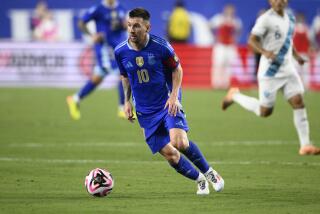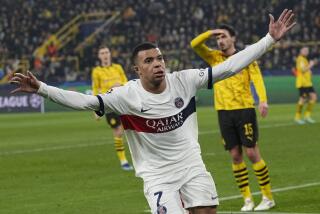FIFA Is Creating a World of Confusion
- Share via
European champion Real Madrid of Spain and South American champion Boca Juniors of Argentina will square off in Tokyo on Tuesday in a game to decide which club is the world champion.
Or maybe not.
Because FIFA, in its infinite wisdom, decided to launch something called the World Club Championship, the right to the title belongs to Corinthians of Brazil, which won the inaugural tournament in Brazil in January.
But virtually no one considers Corinthians the best team on the planet. Since winning the world title 10 months ago, the club has fired three coaches: Oswaldo de Oliveira, Oswaldo Alvarez and, on Thursday, Candinho, and has become a laughingstock even in its own country.
Corinthians finished 24th out of 25 clubs in the Copa Joao Havelange, which, in the chaos that is Brazilian soccer, this year replaced the national championship.
So, no, Corinthians are anything but world champions.
On the other hand, Real Madrid and Boca Juniors can make a strong case for themselves with a victory in Japan on Tuesday.
The Toyota/Intercontinental Cup has been played since 1960 and has both a history and a legitimacy. Even though it pits only the best of Europe against the best of South America, it long has been viewed as a world championship match.
FIFA, blind as ever to reality, has ignored that fact and has planned its second World Club Championship for Spain next summer.
And, as usual, rather than featuring only legitimate continental champions, the event has been enlarged from eight teams to 12 and might even be expanded to 16. Everyone and his cousin seems to be in line for an invitation--including Major League Soccer’s Galaxy.
Soccer would be better served if FIFA narrowed the focus of its World Club Championship to the champions of each confederation--six in all--and merged it with the Toyota/Intercontinental Cup.
The event could then be held annually and either based permanently in Tokyo, the preferable choice, or rotated among the six confederations.
As matters stand, all that exists is confusion.
GALAXY VERSUS THE WORLD
Coach Sigi Schmid’s Galaxy team might never get an invitation to Tokyo, but it can reach the second World Club Championship in Spain next July 29-Aug. 12.
To do so, all it has to do is finish first or second in the CONCACAF Champions Cup, to be played at Cal State Fullerton and the Coliseum on Jan. 17-21.
The draw for the eight-team regional championship was held in Guatemala City last Monday and the Galaxy was drawn to play Real Espana of Honduras on Jan. 17 at Titan Stadium. That will be the second game of a doubleheader that also features D.C. United against Alajuela of Costa Rica.
The other four teams in the competition are Toluca of Mexico, Olimpia of Honduras, Pachuca of Mexico and a Caribbean team to be determined early next month.
The final will be played at the Coliseum on Jan. 21, with the winner and runner-up earning a trip to Spain.
MEANWHILE, IN TOKYO
Tuesday’s Real Madrid-Boca Juniors game gives South America the chance to reverse a disturbing trend. European teams have won the last five Toyota/Intercontinental cups.
Ajax Amsterdam of the Netherlands was the winner in 1995; Italy’s Juventus won in 1996, Germany’s Borussia Dortmund in 1997, Spain’s Real Madrid in 1998, and England’s Manchester United last year.
But there is hope. Boca Juniors are coached by Carlos Bianchi, who coached the most recent South American winner: Argentina’s Velez Sarsfield in 1994.
“I don’t think there’s any difference in the standard of play between European and South American players,” Bianchi told Reuters on his arrival in Japan.
“The only difference is in terms of economic power. European clubs have a lot of finance and can buy players from any country to make their best team.”
Real Madrid’s captain, Fernando Hierro, offered this view:
“In Europe, they don’t attach much importance to the cup if you win it,” he said. “But if you lose, it is a different matter.”
Meanwhile, Boca Juniors’ most famous fan, Diego Maradona, was refused a visa to enter Japan for Tuesday’s game “because of his prior record related to drugs,” according to a spokesman for the Japanese embassy in Buenos Aires.
TALKING POINTS
* Mario Zagallo, Brazil’s 1998 World Cup coach, denied before a Brazilian Senate commission that team sponsor Nike forced him to play an obviously unfit Ronaldo in the final against France, saying: “I am no puppet.”
* Lido Toledo, Brazil’s team doctor, told the same investigation: “He [Ronaldo] was sleepy. I do not believe he had a real convulsive fit. The French doctors said he could play, they just asked him not to score against France.”
* Leeds United Coach David O’Leary, after agreeing to buy England national team defender Rio Ferdinand from West Ham United for $25.45 million: “I don’t think any footballer is worth that amount of money. As my wife says, it’s a lot to pay for somebody who kicks a silly white ball around.”
* Bayern Munich goalkeeper Oliver Kahn, on the German champion’s recent run of bad results: “What’s happening at the moment is not that serious. When the season is over, we will all be laughing about it.”
* Yugoslavia’s central defender Sinisa Mihajlovic, on the need for change: “The time has come for talented youngsters to take over and show their quality. My generation has wasted a number of opportunities. We always qualify for the big event, but we never make an impact when we get there.”
FIGO, GO FIGURE
FIFA has nominated three players--Rivaldo of Brazil, Zinedine Zidane of France and Luis Figo of Portugal--for its 2000 World Player of the Year award.
The likelihood is that Portuguese midfielder Figo will be the recipient when the award is presented at the World Player gala in Rome on Dec. 11.
Figo helped Portugal reach the semifinals of the European Championship in June, after which he became the world’s most expensive player when Real Madrid acquired him from Barcelona for $56.1 million.
Rivaldo, the Barcelona midfielder/forward, won the honor last year, ahead of Manchester United and England’s David Beckham and AS Roma and Argentina’s Gabriel Batistuta.
The year before, it was Zidane, the Juventus midfielder, who was selected World Player of the Year.
The winner is selected by a vote of the world’s national team coaches.
COACHES ON THE MOVE
Mirko Jozic was named to succeed Miroslav Blazevic as coach of Croatia’s national team. Jozic coached Yugoslavia’s Under-21 team to victory at the 1987 World Youth Cup in Chile. . . . Omar Pastoriza resigned as Venezuela’s national coach after the team’s poor results in World Cup qualifying. . . . Carlos Alberto Parreira, who coached Brazil to the 1994 World Cup, quit as coach of Pele’s old club, Santos, after only 28 days in charge of the team. . . . Former Spanish national team coach Javier Clemente is under consideration as coach of the struggling Olympique Marseille in France. Former French national team player Luis Fernandez last week turned down the job.
More to Read
Go beyond the scoreboard
Get the latest on L.A.'s teams in the daily Sports Report newsletter.
You may occasionally receive promotional content from the Los Angeles Times.






